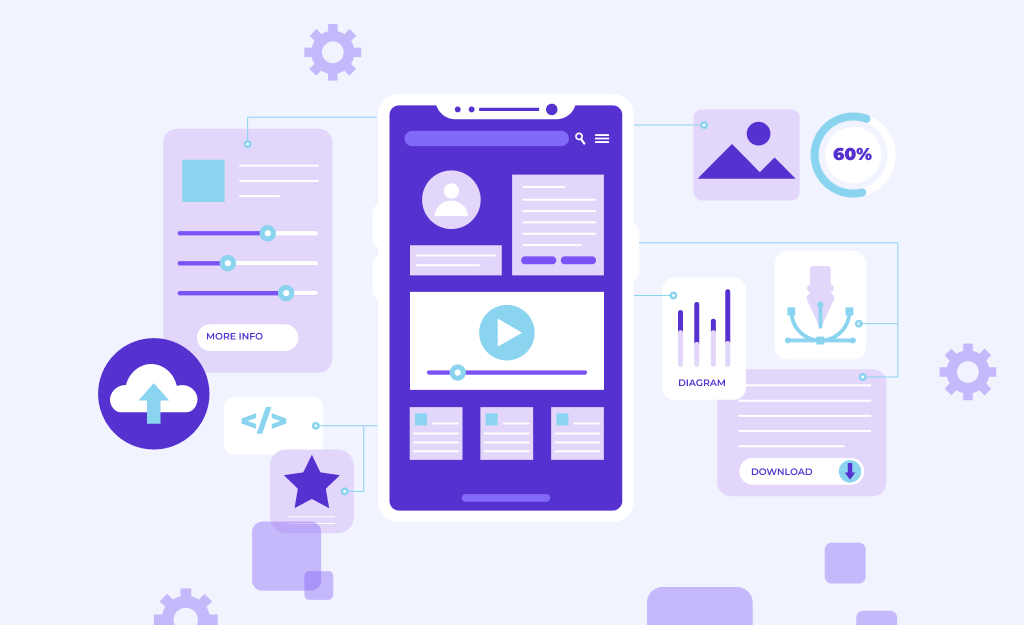Global Educational Technology Market Outlook
In the media, EdTech is often synonymous with online education. In fact, this concept is much broader and includes the entire set of digital tools aimed at improving the efficiency of the educational process.
In addition to online schools, interactive courses, web & mobile learning applications, the market also implies electronic systems for educational institutions, VR simulators, corporate training platforms, and many other products.
Let’s check what’s happening in one of the most fast-growing markets of today.
Contents:
- Why is EdTech one of the most developing industries?
- Some curious EdTech facts
- Types of EdTech startups
- How do EdTech companies make a profit?
- Challenges of EdTech companies
- EdTech trends
- Inspiring EdTech startups
Why is EdTech one of the most developing industries?

The education technology industry (EdTech) received a powerful boost in 2020 when about 1.5 billion students around the world were forced to switch to remote learning. So, EdTech applications, created before/during that time got a skyrocketing boost.
At the same time, it became clear that the state programs of secondary and higher education were not able to meet such demand. The current methods of teaching, which are used in state schools and universities, do not keep pace with the development of society.
The current situation creates favorable conditions for the rapid development of EdTech startups that can replace traditional universities. However, this area also requires certain changes, without which it is impossible to achieve the stated goal.
Some curious EdTech facts

- EdTech is currently valued at $227 billion. Experts estimate this figure will grow 1.8 times by 2025, reaching $404 billion.
- From 2017 to date, 72% of the total investment in this sector falls on local companies, organizations, and individuals.
- In 2020, this market segment attracted increased investors’ attention, who spent $13 billion on the development of this area.
- It is estimated that 90% of EdTech’s market is taken by the United States, China, and India companies.
Types of EdTech startups
| EdTech startup type |
| Tutoring applications |
| Learning management system |
| School administration |
| K12 education apps |
| Test preparation platforms |
| MOOC portals |
| Tech learning solutions |
| Gamified learning apps |
| Language learning platforms |
| Career development apps |
Сompanies represented in EdTech provide a wide range of products, including:
- automation of the learning process;
- products to improve the quality of education;
- projects that allow you to take courses from other universities/colleges;
- communication systems for universities that improve the learning process, solve everyday problems of students, and align studying and administration;
- programs for government employees;
- training equipment.
It is also common for EdTech startups to partner with universities and provide training services to corporate clients. The latter often turn to such companies to find new employees.
How do EdTech companies make a profit?
The earning models of the companies from the EdTech segment include the following:
- Freemium. Companies suggest a limited number of educational courses for free with a transition to paid courses/extended functionality.
- Free period and subscription. The option is similar to the previous one, except that in this case, the user is required to enter bank card details during the registration. After that, the company’s customers can be trained for a certain period free. As soon as it ends, the payment is automatically debited from the bank account, unless the user cancels the subscription.
- Marketplaces. Placement on such platforms allows small startups with a limited budget to enter the EdTech market. In this case, companies have to give part of their earnings to the marketplace.
- Enterprise/B2B sales. Companies sell services not only to users but also to businesses.
- ISA (Income Sharing Agreement). Applies to expensive courses. This model is implemented as follows: a user is enrolled in training, and then, having found a job, deducts part of the income as a tuition fee.
In addition to the revenue, EdTech startups focus on the following business metrics:
- Vocational training: the number of employed clients (as a percentage);
- Marketplaces and tutoring: Loan-To-Value ratio, Net Promoter Score/Customer Satisfaction Index;
- Applications designed for education with built-in advertising: the number of downloads, duration of use, and others;
- MOOC platforms: the number of new users and the percentage of completed courses.
Challenges of EdTech companies
Like any industry, online education has its own challenges to struggle with. Unfortunately, there’s no solution to any of them at the moment, but we keep believing the new generation of Ed-Tech startups will bring a fresh perspective to the industry.
- Delivering value. The main problem EdTech companies haven’t been able to fully solve yet is providing value for learners. Without this, it will be impossible to stay on the market for a long time. In fact, now the main focus of companies is to attract new customers, showing them the real value they could get.
- Engaging. The second problem of EdTech companies is the need to revise the format of learning delivery, making sure every learner stays actively engaged. Initially, this sector was born as a digital version of classical education. But today this approach isn’t enough to cover the learners’ needs. EdTech companies need to radically rethink their approach to education, without resorting to the tools of the classic.
- Socializing. The third problem is the need to find efficient ways of student socialization. Most students receive knowledge remotely, contacting only teachers. However, the isolation we felt during
the coronavirus pandemiconline education would backfire (or has already impacted our mental health). Teenagers need to be mixed with other people, it’s a fact. Otherwise, they become isolated in their world which is not enough to give them answers. So many psychological problems could develop if self-isolation continues. Therefore, EdTech companies need to create their own internal community in which all students will interact.
What the ed-tech startup owners from our network say about their challenges:
Main challenges of our edtech startup is getting funded and getting leads. That’s why we’re now in the funding phase. We retarget investors to get around 3 million dollars. And 90% of this amount of money will be used on paid ads. Without this vast online reach to strengthen the online presence, you can’t really get leads. Out of one million, only five people might become paying customers.
Amin Chaar, ecadema.com
For us, the main challenge is marketing. You need to be present everywhere to spread the word about your app. You need to be present at conferences. You need to make your product to be tested by other people and they write something about Papua. You need to be on the media, you need to be on the radio. You need to be on television, you need to tell prospects about Papua. And, of course, you need to be active on LinkedIn.
Roberto Sabaté Ortuño, Papua
EdTech trends
The rise of EdTech goes hand-in-hand with an increased demand for online learning. According to the Graduate Management Admission Council (GMAC), demand for online MBA programs has increased year by year since 2014.
The pandemic has also seen more institutions turn to EdTech tools to support a transition to online learning. Given the shift in learning preferences, these technologies are here to stay.
How can we expect education to change in 2022? Here are the hottest EdTech trends to look out for:
1. Gamification
Gamification has been in our classrooms for years already (with hackathons and virtual business games), becoming a mainstay of the business school experience. In the future, however, gamification could offer new ways to teach students.
Gamification can help keep students engaged throughout their learning experience. This is a challenge for online programs when there is no in-person requirement and busy lives may get in the way of students’ learning.
With the global education gamification market expected to grow at a rate of 29% between 2021 and 2027, it’s bound to be one of the biggest EdTech trends to look out for in the years ahead.
2. Personalized learning
Big data harnessing allows tailor the learning process to each student’s demand, making sure they keep pace with the others.
Higher educational institutions are already using data analytics to identify students who may need more support before they’ve even started their learning journeys.
At business schools, this could be hugely valuable for online MBA students who don’t have in-person support available to them, allowing schools to identify when students may need more personalized support and improve engagement.
3. Virtual & augmented reality
VR technology enables students to learn faster, according to a recent study done by PwC.
As EdTech tools like video conferencing software become more versatile and incorporate aspects of VR and AR, it will become easier to bring learning experiences to life.
4. Focus on human relationship
Self-isolation helped us understand the value of human contact during the learning process. No matter if it is teacher-student or student-student relationships, being in the classroom among other people has a kind of “magical” effect, encouraging us to learn faster and be more efficient.
That’s why any education technology should be human-centered first of all. The interaction between teachers and learners is the king. The technology should be designed in a way to simplify this interaction, not to cause extra trouble.
Inspiring EdTech startups
Education is a multifaceted market with a variety of products and high competition, where the EdTech industry has a special place.
Transforming learning through textbooks and notebooks to digital learning requires dedication, knowledge, and inspiration.
That’s why I want to share the list of 5 EdTech startups that impressed me with their success stories.
- Zen Educate. The company was founded in 2017 in London and has total funding of about 18 million pounds. The UK startup is used for helping teachers, teaching assistants, and other education-related specialists search for a dream job. Schools and colleges, in turn, use this platform to find professionals for hire.
- Torsh. This USA company covers all segments from early to higher education. The comprehensive platform is used for learning delivery & management, giving teachers innovative techniques to regulate the educational process. They provide numerous features such as a coaching corner, feedback, and observation, custom workflows, etc.
- Unacademy. India’s largest learning platform founded in 2015 was valued at 34 billion dollars in 2021. This platform provides daily live classes, where users can chat with tutors and ask questions. In addition, Unacademy subscription provides access to all live and recorded classes in a specific category that are available to watch from all devices.
- Cloud Guru. The company specializes in providing IT courses. On getting a subscription, a user receives unlimited access to 400+ courses in the digital sphere. Cloud Guru also provides certificates for students after successful completion of a course.
- Applyboard. Having raised 375 million dollars, the Canadian AI recruitment platform aimed to help students get admitted into the best international educational institutions.
Resources:
- https://reports.valuates.com/market-reports/QYRE-Othe-1F324/k12-education-technology
- https://smartbranding.com/global-edtech-unicorns-and-their-domain-choices/
- https://www.linkedin.com/pulse/5-basic-domains-educational-field-chander-moorjani/
- https://www.holoniq.com/notes/global-edtech-venture-capital-report-full-year-2021/
- https://www.grandviewresearch.com/industry-analysis/education-technology-market




